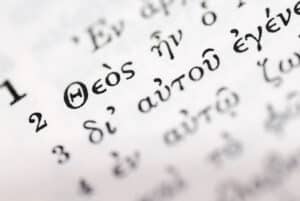For nearly 400 years, the King James Version held the top position amongst Bible translations. Over the past fifty years, however, modern Bible translations like the New International Version (NIV), New Living Translation (NLT), and the English Standard Version (ESV) have grown in popularity. The translation that used to dominate the English-speaking world slipped to second place, with the NIV enjoying over two times the sales of the KJV today.
For many who grew up with the KJV, this is an unfortunate loss. For them, the “Authorized Version” (as the KJV is affectionately called) is the only worthwhile Bible translation. In fact, there are congregations that call themselves “KJV Only,” and hold to the belief that the KJV is the only translation that is true, accurate and God-inspired, and that modern translations are false representations of the Scriptures.
These tenets have triggered the “KJV Only” debate. This article will look at both sides of this argument, first the objections to the “King James Only” side, and second, supporting arguments for the “KJV Only” position.
The Objections
1. The KJV Uses Obscure English Words and Phrases
Written in 1611, the KJV uses words from that period which are no longer used in modern English. Examples include: chapt, habergeon, almug, neesings, pilled, strake, trode, wimples, ouches. Here’s Genesis 31:36, “And Jacob was wroth, and chode with Laban.”
Consider the same verse in the English Standard Version: “Then Jacob became angry and berated Laban.”
Many Christians are intimidated by the vocabulary in the King James Version. They argue that a modern translation is far easier to understand.
The KJV also uses words whose meaning has changed over the centuries. Consider 1 Peter 2:12, “Having your conversation honest among the Gentiles.” If this is all you have for this verse, you would assume that Peter is talking about speech.
However, that is not what the original Greek means. Here’s a modern translation: “Having your conduct honorable among the Gentiles” (NKJV). The English meaning for conversation has drifted considerably over the centuries. On Dictionary.com, the sixth meaning for conversation is “Obsolete: behavior or manner of living.” So, if all you had was the KJV, you’d get the meaning of this verse entirely wrong. [For another example, check out Psalm 5:6: “Thou shalt destroy them that speak leasing” (KJV), where leasing is an antiquated word for falsehood].
Many Christians are intimidated by the vocabulary in the King James Version. They argue that a modern translation is far easier to understand.
To be fair, even in modern translations, there are words and concepts that could be difficult for modern readers. Reading Romans and understanding words like “justification” and “sanctification” might take some explanation for those not familiar with Christianity.
Drastic Changes in Meaning
But there is a difference between explaining biblical concepts that are foreign to us today, which exists regardless of the translation, and adding another layer of confusion by using antiquated English terminology. Do we really want an individual Christian sitting at home sifting through English terms and phrases that haven’t been used for decades?
Recognizing this problem, the updated New King James Version (NKJV) was published in 1982, modernizing the KJV’s archaic English. So Jacob no longer “sod pottage” but rather “cooked a stew.” That certainly makes more sense to us today. For those who want to maintain the KJV fundamentals without the archaic language, this is certainly a worthy option.
However, the NKJV still uses the same Greek manuscripts that the King James translators used in the early 1600s. The next objection against the “King James only” position is more technical and involves the quality of those original manuscripts.
2. The KJV Uses Deficient Greek Manuscripts
The objection concerning archaic language doesn’t require us to have an English degree to understand it. But this next objection leaves the vast majority of Christians with only one option: trust the scholars and experts who have spent their entire careers studying the original manuscripts used to translate the Bible.

Keep in mind that the Bible’s original writings were written in Hebrew and Aramaic (Old Testament), and Greek (New Testament). The primary goal of accurate Bible translation is to attempt, as best as possible, to establish what the original writings actually recorded.
The problem is we don’t possess any of the original writings. What we do have, though, are thousands and thousands of copies, translations into dozens of languages, and quotations by Jewish scholars and early church leaders. By cross-referencing this evidence, scholars are able to determine what the original text said. The difficulty, though, is attempting to discern the trustworthiness of this mountain of evidence. Not all of it is of equal quality.
The Deletion of Verses
To show how important this issue is, consider Matthew 18:11. If you consult a modern translation like the NIV, you’ll find that this verse is skipped! Granted, the NIV lets us know in the footnotes that some manuscripts have a verse there, but the scholars who translated the NIV didn’t trust this manuscript evidence enough to include the verse in the passage. Other examples of “deleted” verses in the New Testament include Mark 7:16, Acts 8:37, and Romans 16:24. Long sections like Mark 16:9-20 and John 7:53-8:11 are also demarcated in many modern translations as most likely not in the originals. Thankfully, they will often point out these differences in their footnotes.
The King James translators did not have access to the dozens of manuscripts that have been discovered in the centuries after the KJV was produced.
For KJV purists, this is a clear violation of the biblical command to not remove words from God’s revelation (Rev 22:19).
The problem with this argument is that we aren’t certain if those verses were actually in the original writings or not. Put simply, there are two main manuscript streams used for translation work. The King James translators did not have access to the dozens of manuscripts that have been discovered in the centuries after the KJV was produced. These manuscripts are older (in some cases, as much as six to nine centuries older) and modern scholars often deem them more reliable than the ones used for the KJV.
The Affirmative Arguments
King James advocates will note that the above two issues are not the only ones to consider when determining which translation is the best. They will argue that the King James Version is superior to modern translations for the other reasons, including:
- Thee and ye: Modern English doesn’t distinguish between the singular and plural forms of you, but the KJV helpfully does (singular thee, plural ye) so readers can more easily track the original Greek and Hebrew distinctions between the two.
- Italics: Because word order in the original languages is much different than in English, all translations have to add words to make the English text readable. The KJV helpfully puts these words in italics. Because modern translations don’t, readers are unable to distinguish between original words and those added by editors.
- Modern bias: The KJV avoids modern problems that occasionally creep into translations today, for example, the backlash against Today’s New International Version (TNIV) when it introduced gender-neutral language.
Add to the above the beauty, poetic rhythm and cadence, and flow of its prose—making it far easier to memorize and recite—and you can see why KJV purists prefer this 400-year-old translation over modern ones.
Which to choose?
English readers today are blessed with a plethora of translations from which to choose. The Kin James translation has stood the test of time because it used the best manuscripts available at the time. Many modern translations using word-for-word or formal equivalence translation philosophy use the best available as well. Whether one chooses the KJV alone or uses other translations as well, the beauty and poetry of the KJV remain true and unsurpassed.

